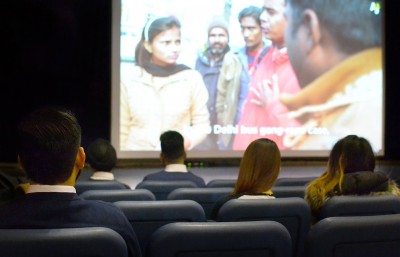
The Boston University chapter of a South Asian fraternity held its annual Sexual Assault Workshop Friday to discuss the prevailing culture of sexual violence in South Asia.
The brothers of Iota Nu Delta focused on recent incidents that had occurred primarily in India and tied it back to the BU community through the conversation held in the George Sherman Union’s Conference Auditorium.
Gurvir Dhaliwal, a senior in the Questrom School of Business, said the fraternity aims to highlight problems pertaining to sexual assault that continue to arise on college campuses and shed light on how similar issues have been affecting other countries.
“[Our previous efforts] used to be a campaign with the slogan ‘Real Men Don’t Rape,’” Dhaliwal said after the workshop. “About three years ago, we first held this event to educate about sexual assault on different college campuses, but we thought there wasn’t enough focus on these other countries, specifically more developing countries such as India.”
During the workshop, the brothers of Iota Nu Delta underlined the lack of a national system in India, such as the one in place in the United States. Regrettably, anonymity is nonexistent in India, and any case brought to the police is made very public, they said.
Dhaliwal said raising awareness on college campuses in the United States plays a crucial role in improving the situation elsewhere.
“It really starts with us here,” he said. “If we can make it a standard of it not happening and it’s completely seen as a truly obscene thing for anyone to do, then I think that will only do better for other places in the world.”
Dhaliwal said there is a large disparity in the United States and India concerning education and awareness of female abuse.
“It’s almost sad that [sexual violence] still occurs here [in the United States] because I guess the excuse that is made for other countries like India is that these kids growing up there don’t have that education,” Dhaliwal said. “It kind of sheds light on how these countries are really far behind.”
Dhaliwal said the abusive culture that reigns in India is one that continues to embrace the notion that women are inferior and that education is key to breaking the existing negative cycle in society.
“It’s hard to change a whole culture,” Dhaliwal said. “It’s a generational thing. Hopefully the new generations will learn just from getting more exposure from the outside world of really what is women empowerment and that women should be treated equally.”
All members of BU’s Alpha Kappa Delta Phi chapter were present at the workshop in support of sexual assault education. One of the members of the sorority, Alexandra Lam, a sophomore in the College of General Studies, said her sorority is involved in a similar effort to combat assaults against women.
“This topic is a personal one for our sorority, as we lost one of our sisters to violence,” she said. “Today highlighted important issues, such as victim blaming, educating and creating awareness about sexual assault. On Jan. 31, National Violence Awareness Day, we held a self defense workshop, and on Jan. 29, we held a domestic violence screening.”
Several students said widening the scope of the conversation on sexual violence to other parts of the world is just as important as tackling the issue domestically. Amber Henriquez, a sophomore in CGS, said educating students on sexual assault and the challenges that exist in other cultures can create a more open campus community.
“With all the uproar about inequalities on campus, it’s important that as college students, we are fully educated on the inequalities faced by other cultures so that we can be more sensitive and provide a safer and more harmonious environment among students,” Henriquez said.
Lia Rivera, a sophomore in the College of Communication, said open communication on subjects such as sexual assault and inequality are important to make change possible.
“[Increasing awareness] gives students information on things that they may not be searching for but want the answers to,” she said. “When issues of sexual assault and inequality arise, it also allows students to self-reflect. If they see that they act or think similarly to the issue, they might reconsider their own actions, causing them to grow as an individual.”
Brianne Garrett contributed to the reporting of this article




